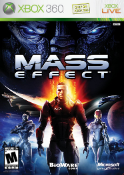Mass Effect Review Rewind
|
|
See PixlBit's Review Policies

On 03/06/2012 at 10:44 PM by Julian Titus The epic tale of Commander Shepard begins here! |

It's a little rough around the edges, but if you have any interest in Mass Effect, starting from the beginning is way more rewarding than jumping in later on.
Mass Effect was a watershed moment for developer, BioWare. It was the game that solidified their presence on consoles, building on the success of Star Wars: Knights of the Old Republic and Jade Empire. It was also their first truly smash-hit original IP thanks to its publishing deal with Microsoft Studios. Five years later, and on the eve of the conclusion of the “Commander Shepard Trilogy”, how does the original Mass Effect hold up?

Mass Effect is a game that has always been a little misunderstood. It wears the clothes of a third person shooter, but in truth Mass Effect is an RPG to the core. In fact, I would call it one of the purest examples of the role playing genre in this console cycle. Even though you directly control Commander Shepard (either the default version or one of your own creation), aim and shoot at enemies, this is just the most basic element of the gameplay, just as selecting “fight” in a turn-based JRPG would be.
If you want to get the most out of the Mass Effect experience, you need to pay attention to how you spec your character. Mass Effect features a detailed tech tree for Shepard and your six squadmates, and no matter which of the six classes you choose, where you spend your attribute points will seriously impact gameplay. The weapons—which are purposely weak and inaccurate at level one—become much more effective as you level them up. Similarly, putting points into a biotic (read: Force) power like Lift will seriously augment its power and duration, giving the player complete control over each battle. The problem with all of this is that the game gives you little to no information about how all these systems work. If you’re not paying attention, it’s easy to miss out on how to maximize your effectiveness in battle.

It’s possible to play to play Mass Effect like a watered-down shooter, but the game has a pause feature that allows the player to queue up attacks for all three active party members. Simply holding down the RB button freezes the action, and once this is done the true essence of Mass Effect’s combat comes through. Have an enemy with shields? Tell Garrus to use Overload to knock them out. At the same time, you can get Liara to put another enemy in Stasis, taking it out of the equation for a while. That lets you deal with the battle using your own abilities. Maybe you have access to a biotic Singularity, turning the entire room into a maelstrom of dark energy. Or you can use the Carnage Blast of the shotgun to fire a powerful explosive round into a group of enemies. Mass Effect isn’t about taking cover or being super accurate with a sniper rifle; it’s about using the abilities of your squad to control a room full of enemies with deadly efficiency. That may turn off people looking for a polished shooting experience, but for me, each encounter in Mass Effect is a fun challenge of tactics and execution.
Complementing this methodical battle system is a deep, albeit convoluted, equipment and weapon upgrade system. Suits of armor are plentiful, and can be purchased, looted from enemies, or found in crates and storage lockers. Three of your squadmates have very alien forms, so they need specialized armor, all of which comes with varying levels of protection. These can be further modified with various upgrades that can do things like protect against specific damage types, increase shields, speed up health regeneration, and more. The same can be said for the multitude of weapons; as you go up in difficulty levels, the upgrades you fit your guns with become crucial. Unfortunately, the inventory system is needlessly complex and can be confusing, especially if you’re in a hurry. It can also be a pain when your inventory starts to fill up, as the game will tell you that you need to clear space before picking up new items, without letting you check to see if those new items are better than what you already have. Despite this, having access to armor and weapons that look and behave differently through the course of the adventure gives a sense of progression that is palpable. By the time you reach the endgame, Commander Shepard feels like a walking battalion, decked out in impressive armor and one-shotting weaker enemies left and right.

As the first human to be promoted to the rank of Spectre—the police force of the galactic council—Commander Shepard must embark on a quest to stop the rogue Spectre Saren, who has allied with the robotic Geth. His ultimate plan is unknown, and to get to the bottom of it, Shepard will assemble a squad of human military and alien warriors as they chase Saren through the galaxy.
These voyages will take you all over Citadel space, across a multitude of quests and battles. The actual story is broken into about five major missions, but as you explore and talk to NPCs and your fellow squadmates, you’ll add a host of side quests to your journal. These quests vary in quality, as many of the planets you’ll visit tend to be barren, and many of the structures you encounter seem built off of the same template. But the core missions are expertly crafted, with each one requiring Shepard to make some hard choices.

“Choice” is a big part of BioWare RPGs, and that remains true here. Commander Shepard will always do the right thing in the end, but how he or she goes about it will vary. You may come across a hostage situation and want to use diplomacy to resolve the conflict without shedding blood. Or, you may choose the quick and dirty route, saving the hostages at the expense of their captors. The choice is yours, and this ability to create and mold Commander Shepard the way you want builds a sense of ownership of the character that is rare in an industry of distinctly defined characters. Knowing that many of these decisions will have repercussions in Mass Effect 2 and 3 makes them all the more important, adding weight to everything you do. Take the time to immerse yourself in the story of Mass Effect, and the game will reward you with a richness of universe as deep as anything you’ve ever seen. This is a love letter to all things science fiction, and it wears those influences with pride.
Of course, not all is perfect in the world of the first Mass Effect game. This was an early Unreal Engine 3 title, and as such features the stuttering framerates and slow loading textures that were commonplace in 2007. The once impressive facial animations look sometimes painful by today’s standards, and the impressive biotic powers can cause the game to spaz out, pushing enemies through walls or causing problems with the ragdoll physics.

Beyond the overly-convoluted inventory management screen, this game is host to one of the worst vehicles I’ve ever encountered in a video game: the Mako. This lunar lander/tank has terrible, floaty controls, which are made worse by the fact the vehicle drives in the direction that the turret is facing. Since aiming to shoot in first person with the Mako is a necessity while exploring a planet, it can be very easy to get turned around. If some changes were made to the way this vehicle controls, planetary exploration would be a blast. As it stands, trying to explore every nook and cranny in Mass Effect can become a chore at times.
Mass Effect was a flawed gem when it came out in 2007, and it remains so today. As a player that values RPGs with deep customization, strategy, and level progression, I prefer this game to its more polished but shooter-centric sequel. The relationship my Commander Shepard built up with his crew and squad over the course of the 40 hour adventure was a revelation for me when the game was new, and I still consider the characters and writing to be some of the best I’ve experienced in a video game. This is a universe that is as special to me as Star Trek and Battlestar Galactica, and I will always come back to the SR-1 Normandy anytime I want to play the other games.









Comments